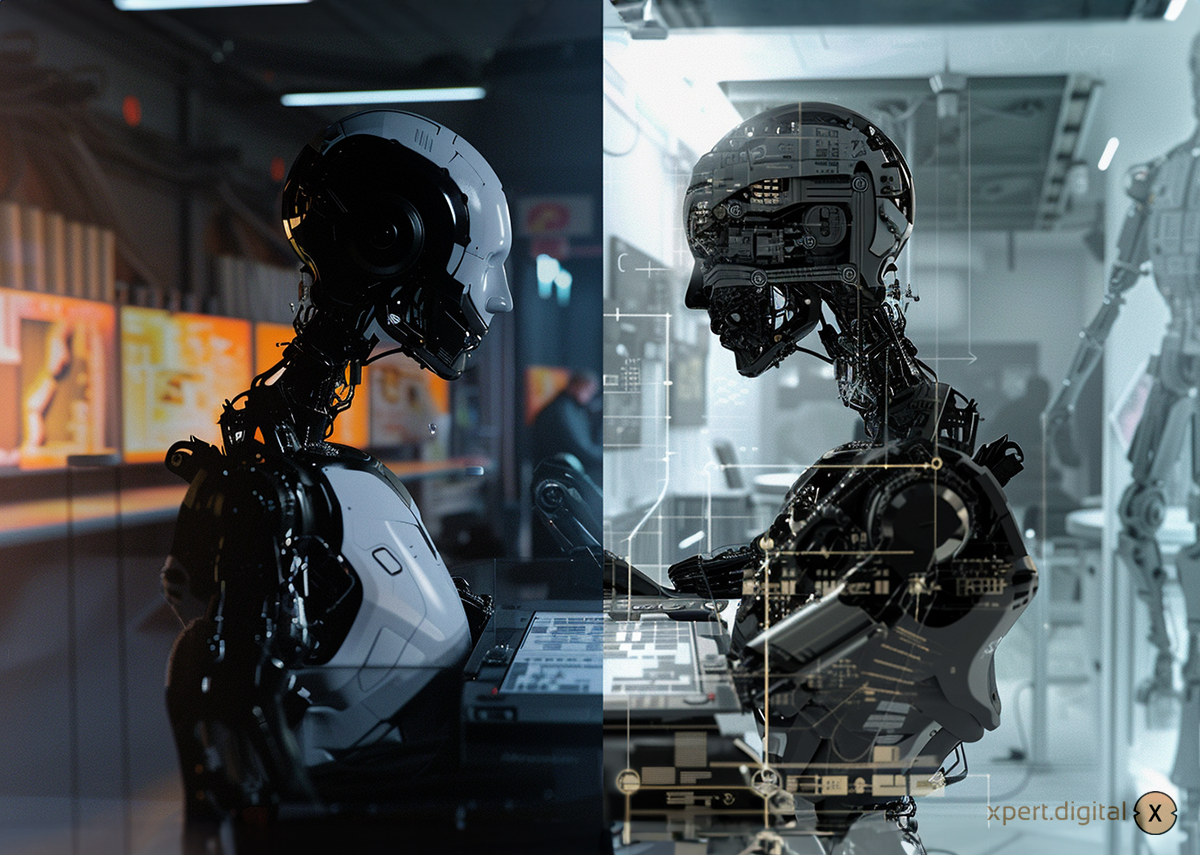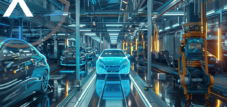
Industrial transformation through artificial intelligence: Visions and reality – Image: Xpert.Digital
🤖 Is AI the future or just hype? A realistic assessment
💰 $15 trillion through AI by 2030: Reality or wishful thinking?
It is said that AI will revolutionize all industries and fundamentally change the way we work. These predictions sound impressive, even sensational, but how realistic are they really? Is it truly the beginning of a new era, or just clever marketing by big tech companies? Because every day we are confronted with increasingly audacious and ambitious claims about the transformative power of artificial intelligence (AI).
There is no doubt that AI will have a profound impact on many areas. It is predicted that by 2030, AI could contribute over $15 trillion to the global economy. This figure is staggering and indicates immense transformative power. However, when we look at the current capabilities of AI and the challenges that still need to be addressed, one can't help but wonder if these predictions aren't somewhat exaggerated
🤖 Main application area of AI
One of the main application areas for AI is industry and mechanical engineering. The vision of fully automated factories operating around the clock without human intervention is extremely appealing. Robots and automated systems could make production processes more efficient and cost-effective. But how realistic is this scenario?
In reality, numerous challenges must be overcome before we can achieve such a future. One of the biggest hurdles is trust in the technology. For AI to be widely adopted, businesses and society as a whole must develop trust in the systems. There are concerns regarding the reliability, security, and ethical implications of AI.
Furthermore, current AI capabilities are still far from perfect. While many systems can handle impressive tasks, they often only do so within narrow, specialized areas. Generalized intelligence capable of mastering a wide range of tasks across various domains remains a distant goal.
However, this doesn't mean that AI won't make significant progress. Rather, the transformation will be iterative and more nuanced than the sensational headlines suggest. Over time, we will likely see gradual improvements and increasingly impressive applications.
🏥 Use of AI in the healthcare sector
Another area where AI could bring about profound changes is the healthcare sector. AI-based early warning systems could detect diseases earlier and develop personalized treatment plans tailored to individual patient needs. Furthermore, robots could perform surgery more precisely and less invasively than human surgeons.
An exciting example of the use of AI in healthcare is disease diagnosis. Algorithms can analyze vast amounts of medical data and identify patterns that human doctors might miss. This has the potential to improve diagnosis rates and ensure that patients receive the best possible treatment.
📚 Application of AI in the education sector
In the education sector, AI could enable a personalized learning experience. Intelligent tutors could monitor students' progress, create tailored learning plans, and provide instant feedback. This could make learning more efficient and effective, and improve access to quality education worldwide.
💸 AI in Finance
In the financial sector, AI is already being used for risk analysis, trading, and fraud prevention. Algorithms can process large amounts of data in real time and predict market movements. AI-powered chatbots and robo-advisors offer personalized customer service and investment advice based on specific customer needs.
💼 Impact on the labor market
The impact of AI on the labor market cannot be underestimated. There is legitimate cause for concern that many jobs will be automated and people could lose their livelihoods. However, the picture is not clear-cut. While some professions may disappear, new jobs will emerge that require creative and cognitive skills.
One way to mitigate the negative effects of automation is to invest in the retraining and further education of the workforce. It is crucial that people acquire new skills and knowledge to thrive in an AI-driven job market. Governments, businesses, and educational institutions must collaborate to ensure that no one is left behind in the course of technological change.
⚖️ Ethical Dimensions of AI
Another important issue is the ethical dimension of AI. There are legitimate concerns regarding the misuse of the technology and the potential violation of privacy and civil liberties. For example, AI-based surveillance systems could potentially be used for mass surveillance and social control. It is essential that clear ethical guidelines and regulations are developed to protect people's rights and freedoms.
Another ethical dilemma concerns the question of responsibility. If an AI system makes mistakes or causes harm, who is responsible? This question is particularly relevant in areas such as medical diagnostics or autonomous vehicles, where machine decisions can mean the difference between life and death.
To unlock the full potential of AI, these challenges must be taken seriously and addressed. Trust, ethical guidelines, and responsible innovation are key factors for success. Only then can AI deliver on its promise of bringing about profound positive changes in business and society.
The pace of transformation may be slower than current hype suggests, especially in the short term. However, there is little doubt that AI will be a transformative force in the long run. By looking back at the lessons of past technological revolutions, we can better assess how the AI era might unfold.
The advent of the internet, mobile technology, and earlier industrial revolutions brought about profound changes—often slower and more complex than initially anticipated. Similarly, we can expect the evolution of AI to be characterized by iterative advances, challenges, and adaptations. In retrospect, the AI era will undoubtedly be seen as one of the most significant technological transformations of our time.
AI undoubtedly holds profound and hidden potential for the economy, the labor market, and society. However, the path to realizing this potential will be neither easy nor linear. Trust, ethical responsibility, and continuous innovation are indispensable elements along this route. By realistically addressing the obstacles and opportunities, we can lay the foundation for a future in which AI truly transforms – for the benefit of all.
📣 Similar topics
- 🤖 Artificial Intelligence: Visions in the Transformation of Industry
- 🏥 AI revolution in healthcare
- 📚 Personalized educational experiences with AI
- 💸 The financial world in the age of AI: Opportunities and risks
- 🌐 Economic impact of AI by 2030
- 🤔 Ethical considerations when using AI
- 🏭 Challenges on the road to the fully automated factory
- 📈 AI's transformation of the job market
- 🔍 AI and the future of diagnostics in medicine
- 🛡️ A question of trust: The widespread acceptance of AI
#️⃣ Hashtags: #ArtificialIntelligence #Industry40 #HealthRevolution #FutureLaborMarket #EthicalQuestions
We are there for you - advice - planning - implementation - project management
☑️ SME support in strategy, consulting, planning and implementation
☑️ Creation or realignment of the digital strategy and digitalization
☑️ Expansion and optimization of international sales processes
☑️ Global & Digital B2B trading platforms
☑️ Pioneer Business Development
I would be happy to serve as your personal advisor.
You can contact me by filling out the contact form below or simply call me on +49 89 89 674 804 (Munich) .
I'm looking forward to our joint project.
Xpert.Digital - Konrad Wolfenstein
Xpert.Digital is a hub for industry with a focus on digitalization, mechanical engineering, logistics/intralogistics and photovoltaics.
With our 360° business development solution, we support well-known companies from new business to after sales.
Market intelligence, smarketing, marketing automation, content development, PR, mail campaigns, personalized social media and lead nurturing are part of our digital tools.
You can find out more at: www.xpert.digital - www.xpert.solar - www.xpert.plus

